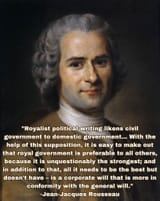Anonymous
 8/27/2025, 8:08:32 PM
No.514141256
8/27/2025, 8:08:32 PM
No.514141256
Aristotle / Since the nature of a State is to be a plurality
>Further, as a means to the end which he ascribes to the State, the scheme, taken literally is impracticable, and how we are to interpret it is nowhere precisely stated. I am speaking of the premise from which the argument of Socrates proceeds, "That the greater the unity of the State the better." Is it not obvious that a state at length attain such a degree of unity as to be no longer a State? since the nature of a State is to be plurality, and in tending to greater unity, from being a State, it becomes a Family, and from being a Family, an Individual; for the Family may be said to be more than the State, and the Individual than the family. So that we ought not to attain this greatest unity even if we could, for it would be the destruction of the State. Again, a State is not made up only of so many men, but of different kinds of men.
Anonymous
 8/26/2025, 3:53:59 AM
No.513998528
8/26/2025, 3:53:59 AM
No.513998528
Aristotle / state is a partnership of families and of clans in living well, and its object is a full and independent life.
And a state is the partnership of clans and villages in a full and independent life, which in our view constitutes a happy and noble life;
>These are necessary preconditions of a state's existence, yet nevertheless, even if all these conditions are present, that does not therefore make a state, but a state is a partnership of families and of clans in living well, and its object is a full and independent life. At the same time this will not be realized unless the partners do inhabit one and the same locality and practise intermarriage; this indeed is the reason why family relationships have arisen throughout the states, and brotherhoods and clubs for sacrificial rites and social recreations. But such organization is produced by the feeling of friendship, for friendship is the motive of social life; therefore, while the object of a state is the good life, these things are means to that end. And a state is the partnership of clans and villages in a full and independent life, which in our view constitutes a happy and noble life; the political fellowship must therefore be deemed to exist for the sake of noble actions, not merely for living in common. Hence those who contribute most to such fellowship have a larger part in the state than those who are their equals or superiors in freedom and birth but not their equals in civic virtue, or than those who surpass them in wealth but are surpassed by them in virtue.
